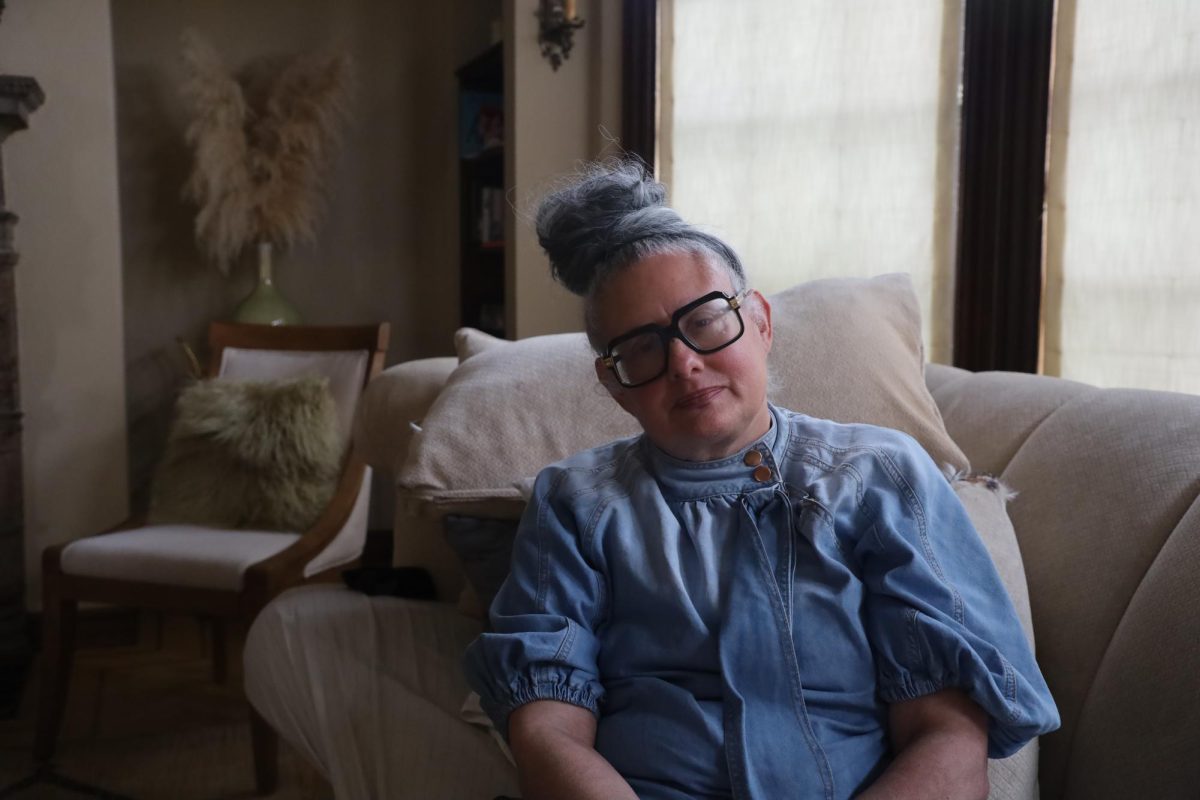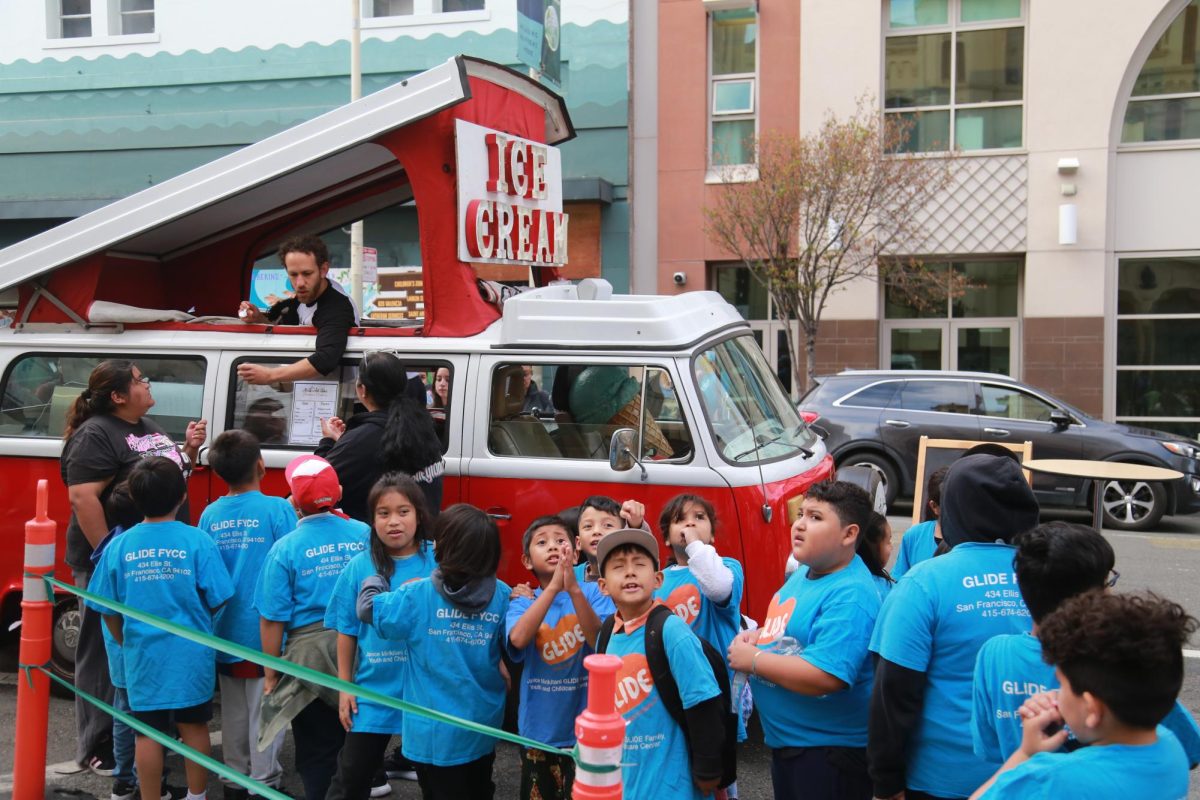
In the downstairs room of an acquaintance’s house in the Castro District, 34-year-old travel writer and local political commentator Stuart Schuffman is surrounded by friends doubling as political confidants. Their agenda is to figure out Schuffman’s political platform for the upcoming San Francisco mayoral race, which he officially entered on June 9. In energetic bursts of speech Schuffman describes to the group what he wants to accomplish, while his advisors help condense those ideas into digestible campaign topics. Schuffman’s mission is unique in that he will not only be running for mayor, but will also be writing about his experience as he goes, informing the public on what it takes to run for political office in San Francisco.
Hailed as an “underground legend” by the San Francisco Chronicle and the “chief of cheap” by Time Out New York, Schuffman got his start making zines and distributing them throughout San Francisco. Since then Schuffman has ramped up his website to become a destination for an alternative take on San Francisco food, events and politics. He has produced a TV show and written three books, all the while keeping his finger firmly pressed against the pulse of San Francisco culture.
“[San Francisco has] really accepted me for as fucking weird as I am,” says Schuffman. “It’s always been a haven for the misfits and the outlaws. And I’m hoping it’ll continue to be that way. That’s kind of why I’m running for mayor. Because it’s important that the world always has a San Francisco.”
According to political analysis, incumbent Mayor Ed Lee has a massive advantage over the other six candidates, all of which have never held political office. Appointed by the Board of Supervisors in 2011 to replace Gavin Newsom after he was elected Lieutenant Governor, Lee has been scrutinized for receiving campaign funds from Silicon Valley venture capitalists and major developers. Now, with a housing crisis no longer looming but present, Lee’s major criticisms have come from a lack of low-income housing for the the city and a focus on high-cost development, such as a push for the Warriors stadium in Mission Bay.
While Lee has an approval rating of 47 percent according to a December KPIX poll, a politician with enough clout to seriously take him on has not entered the race. Schuffman is utilizing his candidacy to write a column on his experiences and the inner dealings of what it takes to run for mayor in an experiment of gonzo-style journalism.
While San Francisco has a storied history of protest candidates few have changed the nature of races, according to Corey Cook, dean of the School of Public Service at Boise State and former University of San Francisco political science associate professor. Cook cited a write-in campaign by Tom Ammiano in 1999 against Willie Brown as the last successful protest campaign in recent memory, despite Ammiano losing in a runoff.
“The energy was substantial and the election changed,” says Cook. “I don’t think you’re going to see a change like that this year.”
With his reports, Schuffman is following in the footsteps of Upton Sinclair, an influential muckraking journalist from the early part of the 20th Century who detailed his plans for a 1934 gubernatorial run in California in his book I, Governor of California, and How I Ended Poverty. While Sinclair didn’t win the election, Cook says the report is regarded as an important piece of muckraking journalism.
“It was absolutely informing,” says Cook. “I think it was an interesting report from an interesting novelist, writer, journalist, and activist.”
Schuffman has already written three articles for the San Francisco Examiner, the second of which he details the amount of money it takes to get your name on the ballot, all the while tying in greater issues of class and poverty. His reports are already hitting a chord within a certain demographic of San Franciscans who feel he is exposing a different side of politics.

“I enjoy his columns,” says San Francisco resident Mark Gunson. “I think they’re hilarious and informative and present an alternative view we are missing at times. Even in San Francisco where we’re supposed to be so fucking liberal.”
Christian Utzman, who runs the Un-scripted Theater Company downtown, also enjoys the reports and likes that they follow a “progressive, independent narrative.”
“I feel like the hip artist scene isn’t being represented,” says Utzman. “If anything it’s being pushed out.”
His reports haven’t been all smooth sailing, however. In what was supposed to be his third posting for the Examiner, an editor’s note appeared before the article stating that Schuffman could not write about his experiences without breaking campaign finance laws, and instead the posting was on another topic.
According to John St. Croix, executive director of the San Francisco Ethics Commission, “referencing his candidacy in his Examiner column would result in an in-kind contribution from the Examiner. These contributions are prohibited if the Examiner is a corporation; if it is not, the value of the contribution cannot exceed $500.”
The California Political Reform Act states that a contribution includes “the granting of discounts or rebates by television and radio stations and newspapers not extended on an equal basis to all candidates for the same office. (Section 82015(c)).”
Essentially, Schuffman can’t publish anything related to his campaign for the Examiner since he is being paid by them. Schuffman can however post to his own website.
“Per FPPC regulation 18215.2, uncompensated posting of his stories on his [personally owned] website, Twitter and Facebook, which reference his candidacy is not an in-kind contribution,” says Croix. “[But he] must comply with the state’s disclaimer requirements.”
Schuffman appears to be taking advantage of this regulation as he posted his fourth report from the campaign trail on July 6.
Through his candidacy, Schuffman wants to push the conversation of the race to talk about issues he cares about, which many of his supporters acknowledge.
“I’m not sure he can win, but yes I think he can influence the conversation,” says Utzman. “People ask what Occupy Wall Street accomplished. Before Occupy people weren’t talking about wealth inequality, but by changing the conversation they won.”
One of the conversations Schuffman wants to influence is the ongoing housing crisis. In recent years San Francisco has seen an economic boom due to the success of Silicon Valley tech companies, which has created an influx of workers to move to the city. This boom caused San Francisco real estate to skyrocket to premium prices and in some cases lead to the eviction of low to middle income families who can no longer afford to live in the city. Policy makers are now having to scramble to come up with solutions that support affordable housing.
One of the proposed solutions was Supervisor David Campos’ Mission moratorium bill, which Schuffman publically supported in a video posted to his website. The bill, which would have halted the private sale of land in the Mission district for 45 days so the city could buy and build affordable housing as well as figure out appropriate future development regulations, failed 7-4 June 2 after seven hours of community comments. The bill will appear on the November ballot for the public to vote on, however.
While the decision didn’t go the way he had hoped, Schuffman said he would like to see more solutions that go outside of a self-regulating market. Schuffman cited a recent decision in Berlin to cap rent rates as something similar he would like to implement as mayor. The German capital, which has seen a skyrocketing rent market of its own, implemented a law which bars landlords from increasing rent more than 10 percent of the local average.
While Lee opposed the moratorium, he has come up with his own solution by proposing a $310 million housing bond which will appear on the November ballot and require a two-thirds majority to pass. If passed the bill will be used to develop 30,000 affordable units by the year 2020, with $50 million set aside for the Mission District.

While Schuffman’s platform isn’t set, in the June meeting he and his advisors talked about addressing three other topics, the first being homelessness in the city, which he calls an epidemic. This involves working with homeless shelters and talking with them to cater to specific needs, as well as providing safe injection sites, wet houses, and navigation centers. Safe injection sites and wet houses allow homeless people and addicts to use drugs and alcohol while receiving services, and navigation centers house homeless people for 10 days while aid workers help them find permanent housing.
Though safe injections sites and wet houses are controversial, Schuffman’s campaign plans to site a successful experiment in Vancouver which allowed safe injection sites and is now being considered in other Canadian cities. The Housing Opportunity, Partnership and Engagement project, a San Francisco based government program, also supports the implementation of wet houses.
By knowing that he isn’t going to win, Schuffman has the luxury of addressing issues that other politicians won’t touch, such as corruption within city politics.
“It’s not just individual acts of corruption, It’s a whole systemic problem,” says Leef Smith, who has been following politics for years and is advising Schuffman. “It’s a legacy thing that’s being passed from generation to generation. A disabling of democracy.”
Schuffman said corruption surfaced shortly after the Mission moratorium failed when another bill designed to regulate Airbnb rentals was delayed for a month. Justification for the delay was said to be so the Board of Supervisors could get the wording on the bill correct and find out what the implications of the law would be. This is essentially what the Mission moratorium bill would have done, and Schuffman feels that because the bill would have negatively impacted developers, it was struck down, while the continence on Airbnb regulation favored the Bay Area startup, which is valued at $25 billion.
During the June 9 Board of Supervisors meeting Supervisor Campos brought up this contradiction and cited it as his reason for voting against the continuance.
“Pauses, as a general rule, are something that I would be open to,” Campos said at the meeting. “But in the context of this neighborhood, this community, the Mission, which was denied a 45 day pause, I say lets act today. And if we can deny the Mission 45 days why should we give Airbnb 30 days?”
To combat corruption, Schuffman wants to implement a new position into the local government to act as a “public advocate,” or someone who oversees complaints and is a third party to investigate possible corruption. This also includes a reevaluation of the Office of Citizen Complaints, as well as how supervisors are appointed by the mayor when replacing an outgoing member.
Schuffman feels that the heart and soul of San Francisco comes from its artists and nightlife, which he sees moving away from the city, and is something he wants to preserve with the fourth piece of his platform. To combat this, Schuffman wants to protect bars and clubs from conforming to new sound restrictions pushed by developers as well as expand Supervisor London Breeds sound ordinance which was passed May 21.
He hopes to make San Francisco a 4 a.m. city and have BART run for 24 hours a day, which he feels will allow tourists and residents to better enjoy the entertainment offerings of the city. Also incorporated into this would be an effort to beautify the city which involves greater investment to support artists with mural projects, which are a historic tradition of the city.
“Culture is not just this thing that you can buy and put on a wall,” says Schuffman. “Culture comes from a lot of different influences that come together and make something unique and special. So just because you want a piece of the culture, the essence, the smell of it, means you have to deal with the other shit that comes along with it. It takes struggle and strife to make culture.”
While Schuffman hopes to push the conversation of the race, his main objective is to inform with his writing and bring an alternative voice to the political process.
“It’s hard to do a straight ahead campaign,” says Schuffman. “It’s not going to work. I know that, I’m not an idiot. But to do this and explore what it’s like and shed light on the process and how ridiculous the process is. And also calling motherfuckers out as motherfuckers.”
To be able to vote in the San Francisco election you must register within the city and county of San Francisco 15 days before election day on Nov. 3, 2015.



![[Video] No Trump, No Feds, No MAGA; San Francisco says "No Kings!"](https://xpressmagazine.org/wp-content/uploads/2025/10/Screenshot-2025-10-28-165913-1200x675.png)



